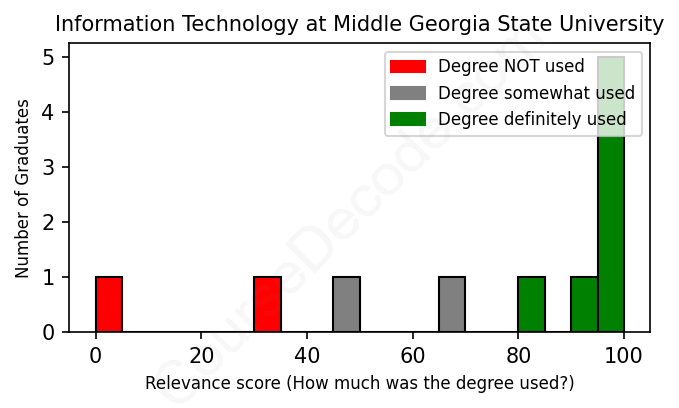
First, some facts. Of the Information Technology graduates from Middle Georgia State University we've analyzed , here's how many have used (or NOT used) their degree in their career:

These are estimates based on AI analysis of 11 LinkedIn profiles (see below).
The verdict? Above average. Overall, with an average relevance score of 74%, Information Technology graduates from Middle Georgia State University have a higher likelihood (+7%) of finding work in this field compared to the average graduate across all fields:
And for comparison, here's the chart for all profiles we've looked at across all degrees.
Also, after graduating, only 27% of these graduates have pursued further education other than another Bachelor's degree (such as a Masters degree or other), compared to the average across all profiles of 35%. This suggests a Bachelors degree is enough for most Information Technology graduates, and it's normal to look for work straight after graduation.
See the details:
|
Relevance score: 91% We think this person has gone into a career highly relevant to their degree. We think this person has gone into a career highly relevant to their degree.
DEGREE INFOGraduated in 2017 from Middle Georgia State University with a Bachelor of Science - BS in Information Technology. Also pursued further education since (see below). JOB HISTORY SINCE GRADUATIONInformation Technology Specialist Georgia College & State University Aug 2017 - Jun 2021 Information Technology Help Desk  Mercer University Jun 2021 - Nov 2021 Internship Trainee  Air Force Civilian Service Nov 2021 - Jan 2023 Information Technology Specialist  Air Force Civilian Service Jan 2023 - Present FURTHER DEGREES DONE SINCE GRADUATINGMaster of Science - MSMiddle Georgia State University 2018 - 2019 ABOUTExperienced Information Technology Specialist with a demonstrated history of working in the higher education industry. Skilled in Windows Server, Cisco Systems Products, Network Engineering, Microsoft Office, and Cisco Nexus. Strong information technology professional with a Master of Science - MS focused in Cyber/Computer Forensics and Counterterrorism from Middle Georgia State University. |
The top 10 most common jobs done by the graduates we've analyzed (ranked most common to least) are:
When looking at the jobs held by graduates from Middle Georgia State University with degrees in Information Technology, it seems like many of them have gravitated toward roles that are directly related to IT. There are quite a few Computer Technicians, Information Technology Specialists, and Network Technicians, which all show strong connections to their academic background. For example, positions like the Network Technician and IT Help Desk Specialist really make use of the technical skills these graduates have learned, allowing them to apply that knowledge in real-world situations.
However, not every job listed has been directly relevant to Information Technology. For instance, roles like Data Entry or Sales Representative are more focused on administrative duties or sales strategies, lacking the tech-heavy requirements that an IT degree usually prepares someone for. It's a mixed bag overall; while there are certainly strong connections to IT in a number of positions, some graduates have ended up in roles that don't utilize their training as much. So, it’s clear that while many have found their way into relevant IT jobs, some have taken paths that lead away from their degree’s core focus.
Here is a visual representation of the most common words in job titles for Information Technology graduates (this is across all Information Technology graduates we've analyzed, not just those who went to Middle Georgia State University):

From the analysis of LinkedIn profiles of graduates from Middle Georgia State University with degrees in Information Technology, it's clear that many of these individuals have ventured into various IT-related roles after graduation. A common starting point for fresh graduates appears to be positions like IT Support Specialist or Help Desk Technician. For example, graduates from the classes of 2015 and 2016 began their careers in roles such as Computer Technician and Tier One Support, respectively. These initial jobs typically focus on technical support, troubleshooting, and customer assistance, which are excellent stepping stones for building a solid foundation in IT skills.
Five to ten years after graduating, many alumni have progressed into more specialized or managerial positions within the IT sector. For instance, graduates have moved on to roles like System Administrator, Information Technology Specialist, and even Project Manager. This upward trajectory suggests that those who start in entry-level positions can successfully leverage their experience to reach higher levels of responsibility and expertise. However, not all graduates stick strictly to technology; there are a few who have slightly divergent paths, like the sales representative role seen among the 2023 graduates. Overall, it looks like many graduates are doing well in their careers, with a strong concentration in relevant IT roles suggesting that a degree from Middle Georgia State University can indeed set the stage for a successful career in the tech industry.
Honestly, getting a Bachelor’s degree in Information Technology at Middle Georgia State University is pretty much on par with what you’d find at similar schools. It’s challenging, but it’s not impossible. You’ll dive into topics like coding, networking, and systems management, and some classes might feel tricky, especially if you’re new to tech stuff. But if you stay organized, keep up with your assignments, and ask for help when you’re stuck, you can definitely handle it. Overall, it requires effort and dedication, but it’s doable if you’re willing to put in the work!
Most commonly, in the LinkedIn profiles we've looked at, it takes people 2 years to finish a Bachelor degree in Information Technology.
Looking at these grads from Middle Georgia State University, it seems like they've had mixed success in terms of making decent money. Some started out in entry-level positions or internships, which can definitely pay the bills but aren't huge moneymakers right off the bat. However, as they gained experience, many moved into roles that typically offer better pay, like IT Specialists, System Administrators, and Project Managers, especially in government or large organizations, which tend to have better pay scales. While the earlier jobs might not be breaking the bank, those who stuck around in tech and worked their way up are likely doing alright financially. It’s a gradual climb, but with persistence, it seems like they could land pretty good salaries down the line!
Here is a visual representation of the most common words seen in the "about" section of LinkedIn profiles who have a Bachelor degree in Information Technology (this is across all Information Technology graduates we've analyzed, not just those who went to Middle Georgia State University). This may or may not be useful:

Here are all colleges offering a Bachelor degree in Information Technology (ordered by the average relevance score of their Information Technology graduates, best to worst) where we have analyzed at least 10 of their graduates: